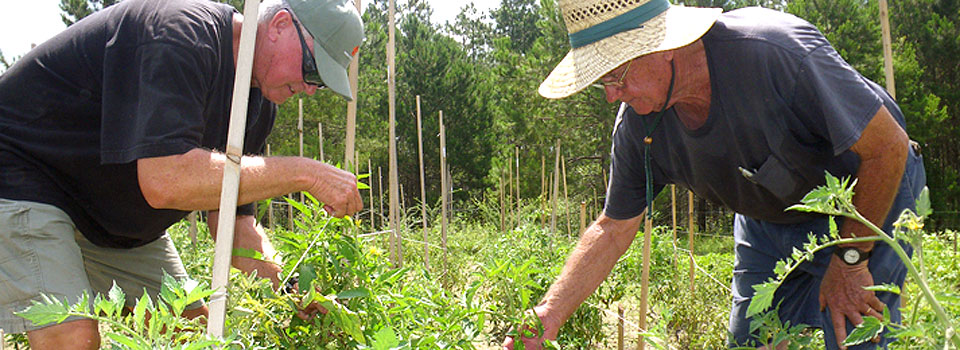Some new gardeners shop hard for the best gloves, hat or kneeling mat. Some new gardeners in Thomas County gear up by wearing matching outfits and working with whatever tools the warden lets them use for the day.
Inmates at the Thomas County Prison in Thomasville, Ga., grow their own food as part of a pilot project designed to teach them new skills and save the prison money.
The prison spends $5,000 a week for food. Of that, $1,000 or more goes to buying produce, Warden Robert Greer said during a recent television interview. Less than $1,000 has been invested in the whole garden project.
R.J. Byrne heard Greer talking about his predicament at a committee meeting. He had a solution.
“I thought, ‘Gosh,’ they’ve got some land out there and 200-plus inmates out there, so we started a garden,” said Byrne, a University of Georgia Cooperative Extension agent in Thomas County. “You can grow some form of vegetable or fruit year-round out here.”
The garden is located on the old county farm. Back in the 1960s and ‘70s, the prison used it to grow vegetables and raise cows, hogs and chickens.
Under Byrne’s guidance, inmates have turned an acre of weeds into a plot teeming with corn, cucumbers, tomatoes, okra, beans and watermelons. Even with startup costs for seed, transplants and fertilizer, he estimates that the prison will save several thousand dollars this year.
Greer got as many as 50 inmates involved during the planning, planting and weeding. And Byrne pulled the community into the project through his county’s Master Gardener program.
“What I originally thought was that the Master Gardeners would give the inmates the chance to talk to somebody outside of the cell and have some positive influence on their lives,” Byrne said.
The Master Gardeners ran with the idea, and now they help scout the garden for insect or disease problems. They also work in the garden alongside the inmates.
Many of the inmates work the garden when they’re needed. But for two of them, it’s their full-time project.
“That is their garden,” Byrne said. “They’re out there all the time. Four to six other inmates cycle through helping out, but it’s their sole responsibility to be in charge of the garden.”
Their work has paid off. They’re now picking cucumbers, tomatoes, peppers and squash. They’re waiting eagerly for the first watermelons to be big enough to pick.
“The bees are working hard out there, too, to get everything pollinated,” Byrne said. “The warden’s talking about having honeybee hives out there. He’s always ambitious about trying new things.”
Along with bees, he’s hoping to grow the garden to include the three surrounding acres.
The project is Byrne’s first attempt at growing a large-scale garden, he said.


